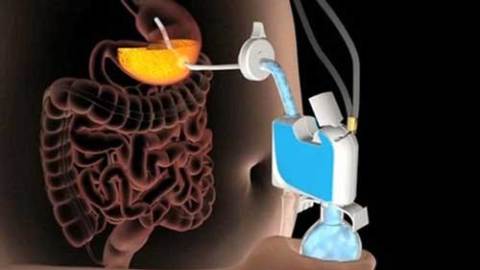Bizarre FDA-Approved Weight Loss System Encourages Eating Disorders

A way to stuff your face without stuffing your stomach—that’s how one news host describes AspireAssist, an FDA-approved stomach pump that drains thirty-percent of your freshly-consumed meal right from your belly.
What a wonderful promise: gorging yourself at the buffet only to dip into the bathroom for fifteen minutes to drain the deep-fried goodness. Easy going in and now, out. After some months on the market, the FDA considers this an acceptable measure in combating America’s obesity problem. But let’s call it for what it is: sanctioned bulimia.
AspireAssist is essentially a catheter—a direct line into your body to let out fluid. The fluid part is true as well: the company behind this device, Aspire Bariatrics, suggests to chew your food slowly so that it will sufficiently slide through the tubing. Amazingly, the company also wants to be your diet coach in the process.
Aspire promises an easy surgery with twilight sedation—you’re not completely out; a general anesthesia reduces anxiety (anxiolysis) and renders you unable to form new memories (anterograde amnesia)—so that “you can go home within a couple of hours and get back to your busy life quickly.”
Incredibly, in one sentence the company summates a large chunk of the problem of obesity. We are well aware of the statistics: two-thirds of Americans are overweight; one-third obese. While the current BMI (body mass index) system is bogus—it systematizes bodies in the same way that the ‘average’ family has 2.1 children—we are well aware we have a destructive cultural problem.
Obesity is both a disease and an instigator of a number of other diseases—type 2 diabetes, insomnia, chronic inflammation, anxiety, and an entire host of immune system-related disorders. The culprit is not diet alone; lifestyle choices play a critical role. The last thing you need is a company promising to hurry you out the door to get back to your busy life. The ‘busy life’ part is as culpable as anything else.
As in a chicken-or-egg fable, Aspire is catering to consumer demand—in this case an easy way to lose weight without having to work too much (i.e. substantially change diet, exercise, sleep more, drink less caffeine, etc.). By shielding itself with nutrition counseling, Aspire appears to be a total weight loss system concerned with your overall health. Given the premise of its device, however, this is improbable.
Humans are not caloric machines. The calorie in/out mentality has long been disproven, but like a chronic itch it won’t leave us alone. Our bodies are not made of Play-Doh that you can remove chunks from at will. The pump does not appear to discriminate between excess sugars, for example, or healthy saturated fats. Like a sewer system it merely pulls out whatever is thrown in.
As stated, weight is not determined by food intake alone, but the complex chemistry of nutrients and environment. Let’s consider anxiety, an important evolutionary adaptation. When an acute emergency occurs, your autonomic nervous system kicks into overdrive. Your heart beats faster, blood pressure rises, and adrenal glands release epinephrine; then your endocrine and immune systems prepare to either battle, flee, or stand doe-eyed in headlights. But, as Peter C. Whybrow writes,
In their evolution each of these systems has been tuned to shut down quickly once the danger has passed. They are not designed to be constantly active and on guard. When called upon to do so, they slowly destabilize the body’s vital balance increasing our vulnerability to inflammation and illness.
Today we are irrationally on constant guard. Getting ‘back to our busy lives’ is not a remedy for weight loss. It’s the mantra of the over-worked consumer—the exact target audience for a device that removes the annoying journey from stomach to colon from your gustatory experience.
Hectic lives are often linked to poor sleep, another multi-billion dollar industry. Lack of sleep leads to an uptick in the hormone ghrelin, which increases appetite, while decreasing the appetite-suppressing leptin. There is a reason we crave junk food late at night or when lacking sleep: our bodies compensate by filling up with carbohydrate-dense foods that, of course, results in weight gain. Coupled with the anxiety produced by lack of sleep and, well, you see the many varied factors involved in this sinister recipe.
But, you know, get back to your busy lives.
There is no silver bullet to solve the obesity crisis. Besides biological reasons, a number of potential triggers must be factored in: agricultural lobbies overproducing certain crops while keeping them unreasonably inexpensive; the economics of food deserts; dietary misinformation, from sugar-laden juice cleanses to the myth of exercise being the main key to weight control; the disastrous wonder of supplements promoted by hucksters and opportunists.
Aspire is a corporation as concerned with courting investors as clients. Like any company, continued growth is the true goal—it markets its device as ‘long-term.’ The expansion of the American waistline is its cash cow. Like the food industry itself, Aspire relies on addictive impulses for success: keeping shoving in the bad stuff, we’ll shovel it right back out.
Then, amazingly, upon hitting the six-month mark Aspire asks you to, “Reward your hard work by shopping for some new clothes!” We can envision an Aspire-ational signature line with Target. If you buy into the idea that a stomach pump is the key to weight loss, executives will say, you’ll most likely buy anything it sells.
—
Derek Beres is a Los-Angeles based author, music producer, and yoga/fitness instructor at Equinox Fitness. Stay in touch @derekberes.





